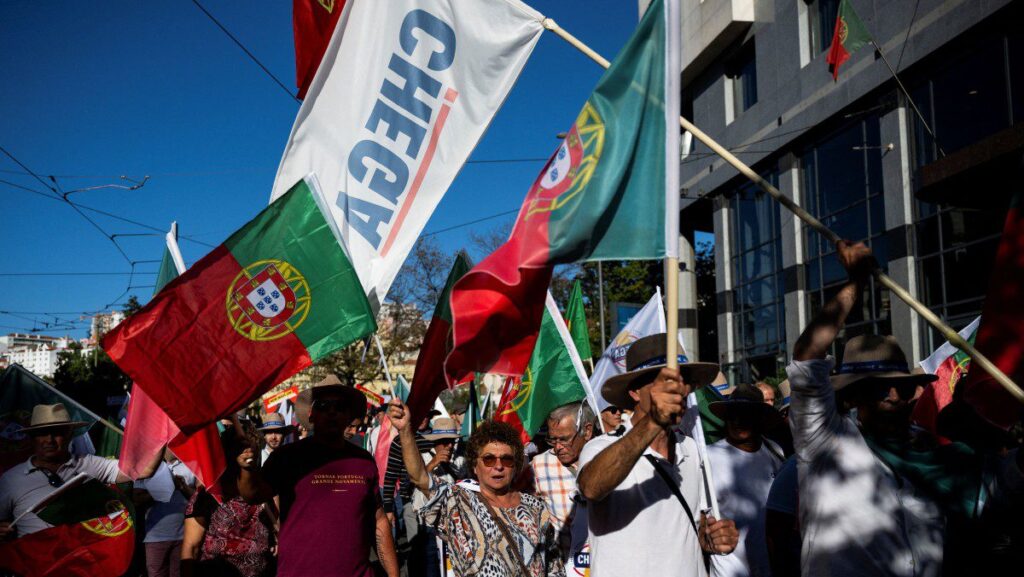Álvaro Peñas interviews Alarico Lazzaro, a writer, essayist, and contributor to the newspaper of the conservative think tank Nazione Futura. Lazzaro is the author of Il lato Oscuro del mondo Greco and Éric Zemmour. Un intellettuale in corsa all’Eliseo, the only book in Italian on Éric Zemmour.
What have these first months of the new Italian government been like, and is it living up to expectations?

I think the Meloni government is the first conservative government in the history of the Republic of Italy. Giorgia Meloni is leading a counter-revolution against the illiberal Left, and she is also promoting pluralism. For me, this is a sign of a new era. For example, in January, there will be an event to commemorate and honour the memory of Sir Roger Scruton, with Francesco Giubilei, Andrea Volpi MP, and the journalist Daniele Capezzone all present. A year ago, such a tribute would have been unimaginable; with Meloni, it is a reality.
As another example: the term ‘meritocracy’ has been revived. For many years, ‘meritocracy’ was a taboo word in Italy; now we have a Ministry of Education and Merit. Schools will now be expected to promote pluralism—that is, the sharing of ideas and allowing different points of view. At the same time, they must fight against the cultural expansion and groupthink that the left wing have imposed. Everything is directed to their way of thinking; if you think something different they call you an extremist or a fascist.
This is also the first time that we have three conservative leaders in the European Council: Petr Fiala from the Czech Republic, Giorgia Meloni from Italy, and Mateusz Morawiecki from Poland. In addition, there are other important developments for the future, such as the case of the Ocean Viking humanitarian ship in the Mediterranean, over which Meloni has forced Macron to review Italy’s souvrainism (sovranismo). The idea of a Europe in which Germany and France have a privileged position does not make sense to Meloni or to Italian conservatives—nor does one that considers countries like Hungary and Poland second-class members. We are all brothers and Eastern Europe can teach Western Europe a lot about what communist oppression meant. The Meloni government is certainly off to a good start.
You spoke of counter-revolution. In Italy, the right-wing is aware that it is facing a left-wing revolution, but in other countries this is not the case.
Yes, and that also applies to Berlusconi. After the Tangentopoli period, Berlusconi won the support of the old Christian Democracy party and became the father of the idea of a new liberal-conservative centre-right. But Meloni has brought a new way of thinking about conservatism into the political arena. The fact that many centre-right parties are frightened by the idea of a counter-revolution and are willing to appease the Left, is largely why these parties are in crisis all over Europe. Spain is, in fact, one of the few countries where such centre-right parties still have significant popular support, with around 30%. In Italy, Forza Italia is in crisis, with only 7% of the vote; in Sweden, the Swedish People’s Party had to make a pact with the Sweden Democrats to govern; in Austria, Sebastian Kurz lost power and the People’s Party is losing support. The centre-right that Meloni represents is, then, a real conservative revolution.
The new government has also taken measures to support the self-employed and to help the most disadvantaged groups in society. It is basically doing what it promised to do!
Exactly, Meloni said that the new conservative government would focus on two fundamental aspects: support for people suffering from the social and economic crisis, and recognition of merit.
Here’s an interesting example: in Italy, under the left-wing government, the ‘cultural voucher’ was introduced: 500 euros for spending on cultural activities for everyone who turned 18; Meloni has introduced a new voucher based on economic situation and another one based on merit, the latter being for all those who get a 100 in their final exams at high school.
On more practical matters, I welcomed the decree against rave parties, because law and order are very important to the Right. Then there’s the opposition to synthetic food, the reduction of VAT, and the rejection of the minimum living income that was to be launched in Italy in 2024. This income was intended to buy votes, especially in the south of the country, and has been abolished to avoid fraud and to encourage people back to work.
On the geopolitical level, it is worth highlighting the support for Ukraine, which is also supported in the European Parliament by the Conservatives and Reformists (ECR) group. There is a deepening unity of conservative vision across the continent, and I believe that this huge scandal, ‘Qatargate,’ will put an end to Ursula von der Leyen’s majority; there is a growing space for true conservatives in the European Parliament.
More like ‘Moroccogate.’
Yes, there are too many scandals, there are too many ‘gates.’ It is terrible that politics is given over to money, and it is a real disgrace for the European Parliament and for the Left. Eva Kaili said that the Left was the only one that could defend the European Parliament, progressivism, and minorities, but in fact all they cared about was money.
Earlier you mentioned the Spanish Partido Popular which, like Forza Italia, belongs to the European People’s Party (EPP). They are quite different parties, however, because the Spanish are very much in the ‘progressive’ line of the EPP, which often votes in the same way as the socialists.
Yes, it is the result of this crazy coalition called the ‘Ursula majority,’ very much linked to political transformism and leftist capture of European institutions. I remember a great speech by Professor Ryszard Legutko (ECR), on the anniversary of the European Parliament, in which he said that the Parliament was alienating voters because it was sending a false message: “There is no European demos and no matter how many times you repeat the word diversity, in this Chamber diversity is a dying breed.” I think that’s a good interpretation of what conservatives think about the leftist capture of Europe; for conservatives, there is a different Europe based on realism and a confederation of distinct nations. Europe is becoming a bureaucratic behemoth. Conservatives must work to promote a new way of understanding Europe, and they must also seek greater independence from the two blocs: the United States and Russia; European interests are too often ignored by both blocs.
You know French politics well. What do you think of the situation in France, regarding the new political scenario?
The dream in France is the “Union of the Right,” and this is more likely to be achieved with Éric Ciotti. I am very satisfied with the election of Ciotti to lead the Republicans because he has been shown to have a more conservative way of thinking. His predecessor Valérie Pécresse, who got 4%—the party’s worst result ever—represented a centre-right that wasn’t really on the Right, but was in reality more centre-left. It was highly symbolic that in the second round Pécresse called for a vote for Macron. Ciotti, however, was very close to Zemmour; I hope that their parties, the Republicans and Reconquête, can work together because they represent Gaullism in society.
Zemmour is a great candidate; he is not a politician, though, but an aristocrat of culture and a keen observer of the political and social situation. I think Reconquête will eventually become a very important force in France. On the other hand, we have Rassemblement National (RN). I have a high opinion of its new president, Jordan Bardella, because I think he is going to introduce very interesting aspects into the political agenda of RN, such as Scruton-style environmentalism, to which Marine Le Pen did not pay much attention, but which Bardella has introduced as a key concern in the new political direction of his party.
The “Union of the Right” is not possible at present, but it would be desirable in the run-up to the legislative elections—not the presidential elections, though. In the last legislative elections Marine Le Pen obtained an historic result with 89 MPs. Zemmour got none, in my opinion because Reconquête is a very young party, but—as I said—it has a promising future. The greatness of France will not disappear if the French vote for Zemmour and Reconquête, I am sure of that.
Zemmour is often identified with the Paris elite, but interestingly Reconquête has a strong component coming from the activism of the ‘identity movement.’
Yes, and that will be a key element in future elections. Last year, Marine Le Pen suffered a leadership crisis and many prominent RN members, such as MEPs Nicolas Bay or Jérôme Rivière, left with Zemmour, so Reconquête also now has many Identity and Democracy members in the European Parliament. It is now the job of Reconquête and Les Républicains to mend the rift between the upper and lower classes. Marine Le Pen has done very well in this respect, because you can only win with the support of a strong cross-class electorate.
Another unique aspect of Éric Zemmour, which you point out in your book, is that he is an intellectual turned politician.
Yes, he is. In my book I analyse his arrival in politics because in recent years France has suffered many structural crises that have undermined the integrity of the country. These crises are what led Zemmour to found Reconquête and to develop a more intellectual approach to the political arena. All over the world we have seen many economists, many businessmen, like Donald Trump or Silvio Berlusconi, enter politics, but we have not seen an intellectual—by which I mean a scholar—do so. France is a great country because of its history and tradition, and it has an incredible pantheon of important counter-revolutionary thinkers, like Joseph de Maistre and Alexis de Tocqueville. All these influences are present in Éric Zemmour’s books. France must rediscover its identity, present also in other intellectuals such as Michel Onfray and Michel Houellebecq, in order to regain its greatness.





